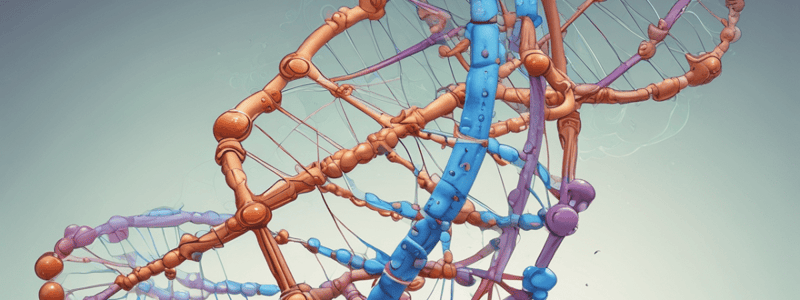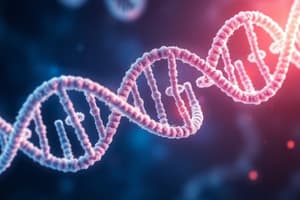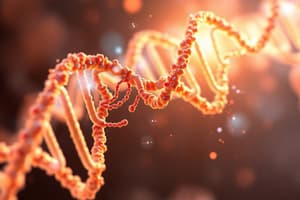Podcast
Questions and Answers
What is the role of the ribosome in translation?
What is the role of the ribosome in translation?
- To synthesize amino acids
- To translate tRNA into mRNA
- To assemble amino acids into a polypeptide chain (correct)
- To transcribe mRNA into tRNA
What is the function of the lac repressor in the lac operon?
What is the function of the lac repressor in the lac operon?
- To synthesize lactose
- To translate the lac mRNA
- To transcribe the lac genes
- To bind to the operator and block transcription (correct)
What is the role of tRNA in translation?
What is the role of tRNA in translation?
- To bring amino acids to the ribosome (correct)
- To assemble amino acids into a polypeptide chain
- To synthesize amino acids
- To translate mRNA into protein
What is the purpose of the TATA box in eukaryotic gene expression?
What is the purpose of the TATA box in eukaryotic gene expression?
What is the result of a frameshift mutation?
What is the result of a frameshift mutation?
What is the role of homeotic genes in development?
What is the role of homeotic genes in development?
What is the purpose of epigenetic marks?
What is the purpose of epigenetic marks?
What is the result of a point mutation?
What is the result of a point mutation?
What is the role of transcription factors in gene expression?
What is the role of transcription factors in gene expression?
What is the purpose of the promoter in gene expression?
What is the purpose of the promoter in gene expression?
What is the role of RNA in the process of gene expression?
What is the role of RNA in the process of gene expression?
What is the main difference between RNA and DNA?
What is the main difference between RNA and DNA?
What is the function of messenger RNA (mRNA)?
What is the function of messenger RNA (mRNA)?
What is the role of ribosomal RNA (rRNA)?
What is the role of ribosomal RNA (rRNA)?
What is the function of transfer RNA (tRNA)?
What is the function of transfer RNA (tRNA)?
What is the process of copying a base sequence from DNA to RNA called?
What is the process of copying a base sequence from DNA to RNA called?
What is the role of RNA polymerase in transcription?
What is the role of RNA polymerase in transcription?
What is the function of promoters in transcription?
What is the function of promoters in transcription?
What is the genetic code?
What is the genetic code?
What is a codon?
What is a codon?
Flashcards are hidden until you start studying
Study Notes
Write### Codons and Amino Acids
- 64 possible codons are used to specify 20 amino acids and 3 stop codons
- UGG specifies the amino acid tryptophan
- CUA and CUG specify the amino acid leucine
- To interpret codons, start at the mid-circle with the first letter of the codon, move out to the 2nd ring to find the second letter, and find the third letter in the third ring
Translation
- Ribosomes use the sequence of codons in mRNA to assemble amino acids into polypeptide chains
- Translation is the process of decoding an mRNA message into a protein
- Steps in translation:
- Begin when a ribosome attaches to an mRNA molecule in the cytoplasm
- As each codon passes through the ribosome, tRNA molecules bring the proper amino acids into the ribosome
- The ribosome attaches these amino acids to the growing chain
- Each tRNA molecule carries only one kind of amino acid
- Each tRNA molecule has three unpaired bases called an anticodon, which is complementary to a codon on the mRNA
Gene Regulation and Expression
- Prokaryotic gene regulation: cells control which genes they express to conserve energy and resources
- Operons: groups of genes that are regulated together
- Lac Operon: a group of genes that are regulated together to break down lactose
- Promoters and operators:
- Promoter: site where RNA polymerase can bind to begin transcription
- Operator: site where DNA-binding protein (lac repressor) can bind to DNA
- Lac repressor blocks transcription, but lactose can bind to the repressor protein, causing it to fall off the operator, allowing transcription to occur
Eukaryotic Gene Regulation
- Similar to prokaryotic gene regulation
- TATA box: a sequence of DNA found about 25-30 base pairs before the start of a gene, which helps position RNA polymerase
- Transcription factors:
- Some open up tightly packed chromatin to help attract RNA polymerase
- Others block access to certain genes, like prokaryotic repressor proteins
- Some bind to DNA sequences in regulatory regions of eukaryotic genes, controlling gene expression
Cell Specialization and Development
- Cell differentiation requires genetic specialization
- Gene regulation allows multicellular organisms to reproduce
- Homeotic genes:
- Control the development and differentiation of body parts
- Found in clusters, with each gene controlling the development of a specific body part
- Exist in DNA of other animals, including humans
- Epigenetics:
- Cells can regulate the state of chromatin by attaching chemical groups to DNA and histone proteins
- Epigenetic marks don't change DNA base sequences but influence patterns of gene expression over long periods of time
Mutations
- Heritable changes in genetic information
- Types of mutations:
- Point mutations: involve changes in a single base pair
- Insertions and deletions: involve changes in the number of bases in DNA
- Chromosomal mutations: involve changes in the number or structure of chromosomes
- Frameshift mutations: occur when one or many bases are inserted or removed from DNA, changing the "reading frame" of the genetic message
- Mutations can have harmful or beneficial effects on an organism
Studying That Suits You
Use AI to generate personalized quizzes and flashcards to suit your learning preferences.




